
Sep 28, 2016
At least one person has died in Uzbekistan cotton fields so far this season, part of the country’s massive mobilization of compulsory labor in which nurses, teachers, students and state employees are forced from clinics and classrooms to toil for weeks picking cotton.
Komiljon Asimov, 20, a biology student at Abduhab State University, died September 11, days after university students were the first group mobilized by the Uzbek government for the fall cotton harvest. In another incident, Dilarom Juraev, 28, suffered a miscarriage in the fields.
Each harvest, Uzbekistan mobilizes more than 1 million residents to pick cotton through systematic coercion. From September through October, many classrooms shut down because teachers are among those forced to pick cotton. Health clinics and hospitals are unable to function fully with so many health care workers also toiling in the fields.
‘You Work Like a Slave from Morning to Night’
“Dinner takes place in the field again. For the dinner we are normally given watery soup,” writes one university economics student from the Andijan Agricultural Institute, who is now picking cotton. “I have no strength left. You work like a slave from morning till night, not enough food, and should sleep and wake up hungry again.”
The student, whose story was collected by the Uzbek-German Forum (UGF), describes being forced from her studies with other classmates to take part in the government-led mobilization. They are housed in a local school building emptied of students, where they sleep on a cold floor, with no showers and limited sanitary facilities.
The student says she spent hundreds of dollars of her family’s money buying food and warm clothing to prepare for working some two months in the cotton fields. Nearly 10,000 students from the four universities in the Andijan region were forcibly sent to work starting September 8.
Uzbeks Coerced into Signing ‘Voluntary Participation’ Letters
Last year, the government went to extreme measures—including jailing and physically abusing researchers independently monitoring the process—to cover up its actions. This year, the tactic appears to be widespread coercion of students, health care workers and others to sign letters indicating they are “voluntarily” participating in the cotton harvest, according to UGF. Employees are told they will lose their jobs and students threatened that they will be expelled from the university if they do not pick cotton or agree to gathering a set weight of cotton each day.
In one video, Alia Madalieva, the head nurse at Clinic No. 8 in Kokand City, dictates to employees the text for their “letter of commitment.” Seated next to a clinic employee in the cotton fields, she dictates: “If I do not collect 50 kg (kilograms) of cotton a day, I will voluntarily hand in my letter of resignation. I wrote this on my own.”
Uzbekistan and Turkmenistan, another country where forced labor in cotton harvests is rampant, this year were downgraded to the lowest ranking in the U.S. State Department’s 2016 Trafficking in Persons Report. Uzbekistan, which gets an estimated $1 billion per year in revenue from cotton sales, also forces farmers to plant state-ordered acreage of cotton and wheat or face the loss of their land.
More personal stories from those forced to pick cotton and other documentation are available at UGF’s new microsite. The UGF is a member of the Cotton Campaign, as is the Solidarity Center, The campaign works to end the injustice of forced labor in cotton harvesting in Uzbekistan and Turkmenistan.
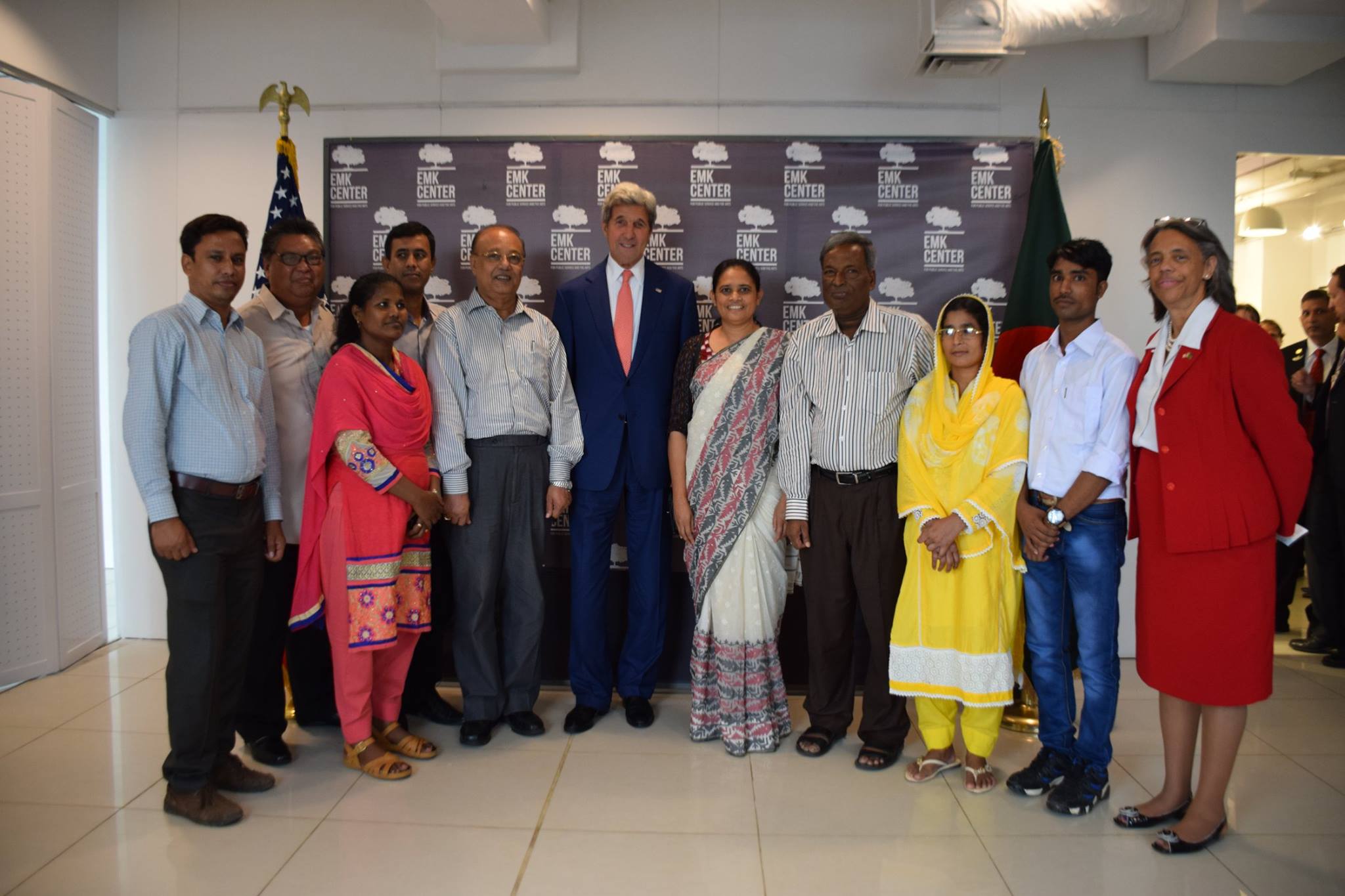
Sep 19, 2016
U.S. Secretary of State John Kerry met with leaders of Bangladesh garment unions recently in Dhaka, where he emphasized workers’ ability to freely form unions as key to workplace safety.
“Enhancing worker safety has to be paired with strengthening workers’ rights,” he told a group of 60 garment workers and allies.
“The fact is garment factories across Bangladesh actually could benefit enormously from empowering laborers, allowing them to form labor unions, affording them full collective bargaining rights, because no one should ever be compelled to work in hazardous or exploitative conditions. It’s really that simple.”
Worker Prosperity Possible with Worker Rights
At the event, which took place at the Edward M. Kennedy center in Dhaka, the capital, Kerry drew parallels between the efforts of Bangladesh garment union leaders to empower workers and Sen. Edward Kennedy’s strong support for working men and women.
“Bangladesh cannot truly meet the aspirations of its people and share prosperity if its workers are not safe and their rights are not ensured.
Kerry noted how “the $28 billion garment industry has played a uniquely important role” in the rise of Bangladesh’s economy. But he cautioned, “Growth on its own—growth just for its own sake—is not our only goal. You can grow and grow and grow and grow, but you can be growing with the wrong values, you can be growing with the wrong outcomes, you can be growing with people not gaining in their rights or in their income or in their ability to get an education.”
Kerry met with six garment worker union federation leaders: Babul Akter from the Bangladesh Garment and Industrial Workers Federation (BGIWF); Amirul Amin from the National Garment Workers Federation (NGWF); Nazma Akter, Sommilito Garments Sramik Federation (SGSF); Sritee Akter, Garment Workers Solidarity Federation (GWSF); Roy Ramesh, United Federation of Garment Workers (UFGW); and Raju from the Bangladesh Independent Garment Union Federation (BIGUF). Two factory union leaders affiliated with BGIWF, Munna and Rina, also attended.

Sep 12, 2016
Gender-based violence (GBV) is one of the most prevalent human rights violations in the world—and yet not enough is done to prevent it, especially at the workplace.
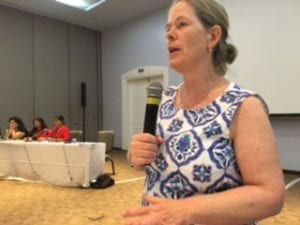
Lisa McGowan, Solidarity Center senior gender specialist, leads a discussion on gender-based violence at work. Credit: Solidarity Center/Tula Connell
“Without gender equality, we cannot have worker rights, and without worker rights, we cannot have gender equality,” says Lisa McGowan, Solidarity Center Senior gender specialist, speaking at the Association for Women’s Rights in Development (AWID) Forum in Bahia, Brazil.
McGowan co-moderated the September 9 AWID Cross-Movement Initiative, “Building Alliances to End Gender-Based Violence in the World of Work,” a panel co-sponsored by the International Trade Union Confederation (ITUC) and the Solidarity Center. Maria Tsirantonaki from the ITUC co-moderated.
Addressing gender-based violence at work is essential, McGowan says, because it undermines the overall struggle to achieve worker rights and gender rights. The two-part session included a discussion highlighting several successful examples of how worker rights organizations combat gender-based violence at work and an opportunity for participants to strategize around a campaign to shape a worker-driven International Labor Organization (ILO) standard ending gender-based violence at work.
The more than 50 participants taking part in the session joined in discussing definitions of gender-based violence at work. Defining GBV at work is important for developing strategies to end it, McGowan says. “The reason we focus on the world of work is because there are different rules that govern that space.
“When we talk about gender-based violence in the world of work, we actually have a pretty specific—although horrifyingly large—set of behaviors that constitute gender-based violence at work,” McGowan said. The list includes sexual violence, verbal abuse, threats of violence and bullying. (The full list is here.)
Unions Key to Ending Gender-Based Violence at Work
Joining McGowan on the panel, a women union leader and a women from a worker association representing workers in Brazil and the United States discussed strategies for successfully ending workplace gender-based violence.
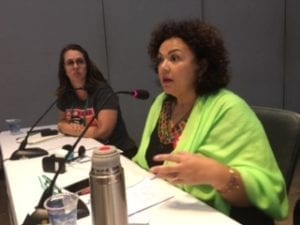
Junéia Batista, CUT national secretary in Brazil, shared how unions are encouraging women to speak out about sexual harassment. Credit: Solidarity Center/Tula Connell
Junéia Batista, national secretary of the Confederation of Workers Union (CUT) in Brazil, discussed through a translator how the union is encouraging women to speak out about violence at the workplace because it is “difficult to report harassment, difficult to get evidence of harassment.”
In Sao Paulo’s banking sector, she says, women recently won a clause in their union contract that prohibits moral harassment in the workplace, giving women an important tool to demand an end to harassment.
Julia Perkins, Fair Food Program Education Coordinator with the Coalition of Immokolee Workers in Florida, shared how the union’s 16-year campaign for the rights of tomato pickers achieved a workplace environment virtually free of sexual harassment. Women in the Immokolee tomato fields, mostly migrant workers from Central America, had been frequently physically and sexually assaulted. Assaults took place in the bus on the way to the fields, with managers who controlled women’s pay, and in the fields.
Recognizing the growers who employed the workers—and the supervisors and staff that harassed them—would not take action, the coalition included concrete and enforceable protections against GBV in a larger system of labor rights and enforcement developed by the workers themselves, called the Fair Food Program.
“Zero tolerance for sexual harassment means workers now know they have a right to stand up for their rights,” says Perkins. The agreement with growers and buyers established a 24-hour call center for workers to report violations of their rights, immediate investigation and remediation, and severe economic consequences for growers who don’t act quickly and effectively to end GBV in their fields and processing centers. Growers must allow worker-to-worker education on company time so “women and men are talking to other women about their right to name and demand an end to sexual harassment and verbal abuse.”
Creating a Campaign to Stop Gender-Based Violence at Work
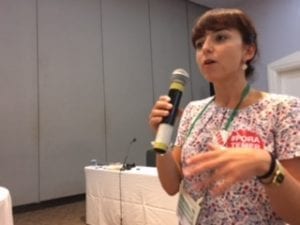
The ITUC’s Maria Tsirantonaki outlines the process by which an issue like gender-based violence becomes an ILO standard. Credit: Solidarity Center/Tula Connell
Turning to the session’s strategy portion, Tsirantonaki outlined the process by which an issue like gender-based violence becomes an ILO standard, or “convention.” Next month, the ILO convenes a meeting with labor, business and government representatives to discuss drafting a gender-based violence at work convention, which will include arriving at a definition of GBV at work, outlining provisions to prevent GBV at work and possibly defining specific groups of workers that should be covered by the convention.
To illustrate the process, Fish Ip, a regional coordinator for the International Domestic Workers Federation (IDWF), described how domestic workers around the world successfully campaigned for an ILO standard covering domestic workers (Convention 189). Passed in 2011, Convention 189 culminated a five-year campaign in which domestic workers networked, met with each other around the globe to define their priorities and described their work experiences in meetings with ILO officials. Twenty-two countries have now ratified the convention, meaning they must abide by its provisions.

Fish Ip describes domestic workers’ successful campaign for international recognition of their rights at work. Credit: Solidarity Center/Tula Connell
Building on Ip’s emphasis on the effectiveness of domestic workers telling their stories and being central to the policy-making process, Janet Lai, a session participant from Global Affairs in Canada, offered suggestions from a small group discussion that including putting working people front and center in the campaign.
“You need the voice of the people who actually experience gender-based violence,” she says. “We need a compelling story, we need a clear narrative and we need talking points.”
The ITUC has launched a website for the campaign to achieve a gender-based violence at work standard, and encourages people to upload stories and other information.
“The voices of the people who are impacted are the voices that must drive the narrative and action,” says McGowan, “because that is where the momentum will come for actual change.
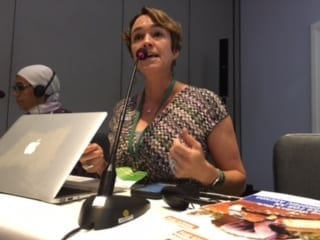
Sep 10, 2016
Globally, women are paid 30 percent less than men—but “imagine instead of corporations making 30 percent more off women’s labor, imagine if that 30 percent were coming back to our communities in the form of wages,” says Shawna Bader-Blau, Solidarity Center executive director.
Speaking on the panel, “Women’s Economic Empowerment and Workers Rights,” a Solidarity Center-sponsored session at the 2016 Association of Women’s Rights in Development (AWID) Forum, Bader-Blau said challenging such wide-reaching corporate power means “we need to partner across social movements.”
Cross-movement building is a goal and theme of the September 8–11 AWID Forum, where more than 1,800 participants from 120 countries are gathering to find strategies for mobilizing greater solidarity and collective power across diverse movements.
Union and worker association leaders from Brazil, Morocco and the United States taking part in the panel shared how unions are helping empower women to achieve economic justice.
Seventy million women around the world are in labor unions or worker associations, says Bader- Blau. “The labor movement is by definition the broadest movement for women on earth that is membership based.”
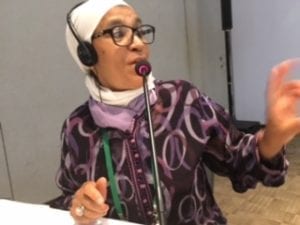
“In the frontlines of this battle we have women who are fighting for labor rights”—Saida Bentahar, CDT Morocco.
In Morocco, the Democratic Confederation of Labor (CDT) in Morocco is helping agricultural workers win bargaining rights with their employers. Most of the workers are women, who live in difficult, fragile conditions, says Saida Bentahar, a member of the CDT Secretariat.
“They sometimes cannot read or write, they live in extreme poverty, they are not paid good wages,” she said, speaking through a translator.
Together with the Solidarity Center, the CDT is training women on their workplace rights, including standing up against sexual harassment.
“Some women wouldn’t even speak at first when we would hold sessions but now they really stand up for what they believe,” says Bentahar. “Together they have written a declaration to guarantee stable labor rights. They will now have equal pay, certificates to assure their skills and capacities. They will have equal opportunities for work and training as well.”
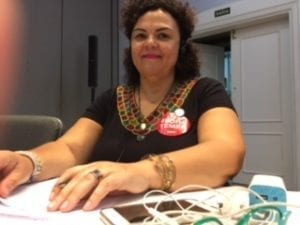
Junéia Batista, CUT national secretary in Brazil, describes union women’s efforts to negotiate day care and other key issues in bargaining with employers. Credit: Solidarity Center/Tula Connell
Junéia Batista, national secretary of the Confederation of Workers Union (CUT) in Brazil, described how women in the confederation have worked to be part of contract negotiations to ensure issues like day care are included, and to achieve leadership since the confederation formed in 1983.
“We want more,” says Batista, speaking through a translator. “It has been 33 years with men, men, men presiding in the presidency,” she says, and women members are working to establish gender equality measures throughout their union structures.
In Mississippi, a state in the southern United States, the Mississippi Worker’s Center for Human Rights (MWCHR) is helping empower working people in Oxford, an impoverished area with a history of racial violence.
“Wages are not the only point of resistance and struggle we need to be dealing with,” says Jaribu Hill, MWCHR executive director.
Panelists also discussed the increasing attacks throughout the world on workers’ ability to form unions.
“Our broader labor movement is suffering from a closing of democratic space,” says Bader-Blau, citing a 30 percent rise in attacks on worker rights around the world. “Our governments, aided by corporate power, are defining worker rights in narrower and narrower terms.”
“In this environment, in this context, we feel it is so important that women’s work be respected and valued … and dignified and that we fight for this,” she says. “The primarily vehicle for fighting for women’s rights at work is trade unionism.”
As Bentahar says, “In the frontlines of this battle we have women who are fighting for labor rights.”
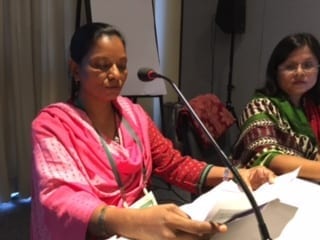
Sep 9, 2016
Bangladesh women garment workers make 20 percent less than their male counterparts and are often physically and sexually harassed. Yet women comprise 80 percent of the country’s 4 million garment workers, and the garment industry accounts for more than 80 percent of Bangladesh’s export earnings, according to Solidarity Center Senior Program Officer Lily Gomes, speaking on a panel yesterday at the 2016 Association for Women’s Rights in Development (AWID) forum in Bahia, Brazil.
The panel, the first of several Solidarity Center-sponsored sessions at the September 8–11 AWID forum, focused on the struggle for gender equality by Bangladesh women garment workers and migrant workers.
When women workers form unions, they improve their working conditions. But it is also necessary for women to shift the gender dynamics, says Gomes. Women now make up more than 61 percent of union leadership in the factory-level unions that have formed in recent years, and women also are participating in Solidarity Center gender trainings, which focus on women’s economic empowerment. Following recent trainings, for example, many women garment workers opened their first bank accounts, and are increasingly becoming more active in their unions.
Bangladesh women also are among the many workers migrating to other countries for jobs, and panelist Lily Jahan, chairwoman of Bangladesh Obivashi Mohila Sramik Association (BOMSA), discussed the group’s training and support of workers, many of them women, who travel to other countries for work.
BOMSA, a migrant worker rights organization, provides workers with pre-departure training about how to protect their rights at work in the countries where they will work, she says, and also provides child care and access to school for the workers’ children.
Bangladesh women workers also are seeking allies in their struggle across the global feminist movement, says Gomes, and panelists sought ideas and support from participants, who included a range of women’s rights activists.
Says Gomes: “We will be connected. We are women. We will make the world hear our voice.”











